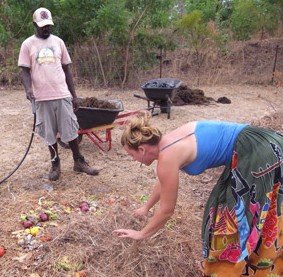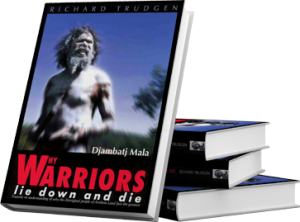Have you ever noticed how it seems that other people just seem to know what they’re doing when it comes to relating to other people?
I believe that no one really does know what to do, and that how we act and what we say in any given social setting is a balance between two things. One, how much we express of ourselves – what we are really thinking and feeling. And two, what bubbles up out of our cultural programming. Now I’m very socially awkward. I really do not programme very well. As a result I end up thinking too much about how I should be acting and what I should be saying, so much so that I usually feel very awkward in a social setting. But being a socially awkward person can be turned to an advantage when we enter a new culture, such as in an Aboriginal community.
Firstly, being socially awkward we are used to standing around looking stupid while we work out what we should be doing. Secondly, we are more likely to admit we’re out of our element and thus ask questions. This is a good thing! Thirdly, we are patient and wait for a more socially adept friend to guide us. Cross-culturally it’s good to find friends within the new culture who can be your social and cultural guide. So by observing, asking plenty of questions, and following our cultural guides we can learn a lot about a new culture and how to respond. And as we learn more we will become more capable in relating to Indigenous people.
However, the socially awkward should be warned – you by no means have the advantage in the cross-cultural situation.
The stand backish approach I have just described is a very safe way to engage in a new culture such as when one starts working with Aboriginal people. But the real trick is to balance this learning and understanding of culture in your head with a different kind of understanding. We could call it learning by experience, but it is not the experience I want to emphasise. It is letting go of our fear to let our real person inside come out. A genuine expression is much more valuable than a cold and calculated one when it comes building relationship with others even in another culture. I have recently realised that for all my experience with Yolngu people, I have huge difficultly knowing how to simply relate to an Indigenous person. Meeting someone in the street the other day I just didn’t know how to express myself to this person. I felt like I needed to know what would be the ‘right’ thing to do. However, after thinking about it I realised that my awkwardness was a disadvantage in this case and that I needed to allow a greater degree of self expression. Some ‘white fellas’ get along very well with Indigenous people because they are able to remain genuine or respond naturally to people. This is a more extrovert characteristic and it is very important for enabling personal relationships with people in other cultures. Visiting, meeting and talking to others is essential to learning to relate to another culture. If we do not allow relationships to blossom we remain marginal to the culture looking at it from the outside. Instead, get involved and let yourself bubble out when ever you can. The danger here is breaking a social rule or taboo and this can be embarrassing or even harmful to yourself or others. However, we cannot allow this to keep us introverted or shy. The trick is to balance natural self expression and being aware of the cultural environment you are in, learning both from the mistakes, and relationships that arise from letting go, and from the observations and questions that arise from awkwardness.





Mark Smith •
Well put Tim, many of my silent sentiments expressed here……thanks for the exposure, affirmation, edumacation, etc…….
Jonathan •
Great article.
Social awkwardness has always felt like a burden to me. These feelings were exaggerated during a recent month-long stay in Peru. Social and cultural influences in my life were exposed while being out of my comfort zone. It seems I’ve always been a bit confused about how to behave. Living in a foreign land just made it obvious and somewhat acceptable. Ultimately, being truthful and genuine was the only way I found to adapt. I suspect that’s a recipe for success no matter who or where you are.
Thank for articulating so clearly what I’ve pondered for years.